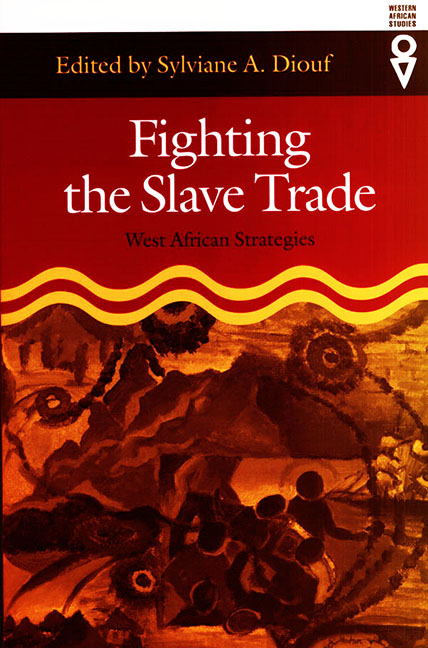Book contents
- Frontmatter
- Contents
- Preface
- Introduction
- PART 1 DEFENSIVE STRATEGIES
- PART 2 PROTECTIVE STRATEGIES
- PART 3 OFFENSIVE STRATEGIES
- 8 Igboland, Slavery, and the Drums of War and Heroism
- 9 “A Devotion to the Idea of Liberty at Any Price”: Rebellion and Antislavery in the Upper Guinea Coast in the Eighteenth and Nineteenth Centuries
- 10 Strategies of the Decentralized: Defending Communities from Slave Raiders in Coastal Guinea-Bissau, 1450–1815
- 11 The Struggle against the Transatlantic Slave Trade: The Role of the State
- 12 Shipboard Revolts, African Authority, and the Transatlantic Slave Trade
- Epilogue: Memory as Resistance: Identity and the Contested History of Slavery in Southeastern Nigeria, an Oral History Project
- Contributors
- Index
9 - “A Devotion to the Idea of Liberty at Any Price”: Rebellion and Antislavery in the Upper Guinea Coast in the Eighteenth and Nineteenth Centuries
from PART 3 - OFFENSIVE STRATEGIES
Published online by Cambridge University Press: 30 August 2017
- Frontmatter
- Contents
- Preface
- Introduction
- PART 1 DEFENSIVE STRATEGIES
- PART 2 PROTECTIVE STRATEGIES
- PART 3 OFFENSIVE STRATEGIES
- 8 Igboland, Slavery, and the Drums of War and Heroism
- 9 “A Devotion to the Idea of Liberty at Any Price”: Rebellion and Antislavery in the Upper Guinea Coast in the Eighteenth and Nineteenth Centuries
- 10 Strategies of the Decentralized: Defending Communities from Slave Raiders in Coastal Guinea-Bissau, 1450–1815
- 11 The Struggle against the Transatlantic Slave Trade: The Role of the State
- 12 Shipboard Revolts, African Authority, and the Transatlantic Slave Trade
- Epilogue: Memory as Resistance: Identity and the Contested History of Slavery in Southeastern Nigeria, an Oral History Project
- Contributors
- Index
Summary
CONTEMPORARY EUROPEAN OBSERVERS AND regional oral traditions allude to large-scale slave revolts and numerous fugitive enclaves in the Upper Guinea Coast in the eighteenth and nineteenth centuries. These escapes and uprisings disrupted politics, the economy, and society. Though scholars have started paying attention to African resistance to enslavement in the continent, studies of the slave revolts and communities in West Africa have been limited (Lovejoy 1986; Lovejoy and Hogendorn 1990; Glassman 1995; Klein 1988; Miers and Roberts 1988). Exaggerations, if not misperceptions, about Africans’ complicity in the Atlantic slave trade and about their acceptance of servitude persist (Thornton 1992). Indeed, many scholars refuse to acknowledge the acts of resistance by enslaved Africans as part of a continuous thread of antislavery in the continent and still insist on seeing antislavery as emanating solely from the religious, economic, and philosophical ideas of the eighteenth-century European Enlightenment (Miers and Roberts 1988; Sanneh 1999).
Knowing the precise nature of the ideas and the forms of social consciousness that animated enslaved Africans is difficult since most of the historical evidence is refracted through the lens of European travelers, abolitionists, and colonial administrators. Nonetheless, these records point to the opposition to enslavement by Africans that were manifested in rebellious actions, the existence of free communities, and in some cases the appropriations and creative reinterpretations of hegemonic ideas. This chapter will show that, in the case of the Upper Guinea Coast, enslaved Africans routinely affirmed their freedom, not by absorption into the slaveholding societies or by renegotiations of dependent relationships—as argued by some scholars—but by outright rejection and opposition to servitude. The two rebellions in the region (the main focus here)—the Mandingo Rebellion in the eighteenth century and the Bilali Rebellion in the nineteenth—attest to the tenacity of the enslaved in resisting slavery and asserting their freedom.
This chapter conceives of resistance as a plethora of spontaneous, organized covert or overt actions designed to thwart the intentions of kidnappers, slave traders, and slaveholders. On a continuum, these actions encompass the quotidian forms of resistance amplified by James Scott (1985) as well as the more violent contestations, which underline the works of C. L. R. James (1963, 1969).
- Type
- Chapter
- Information
- Fighting the Slave TradeWest African Strategies, pp. 132 - 151Publisher: Boydell & BrewerPrint publication year: 2004

